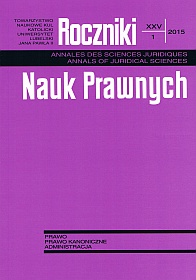The offerings made for the celebration of the Holy Mass according to the 1983 Code of Canon Law and 4th Council of the Diocese of Tarnow
Abstract
The offering handed to the priest on the occasion of celebrating the Eucharist has a long tradition in the Church. Its origin goes back to the old habit of bringing, by the participants, gifts necessary for the celebration of Mass, mainly bread and wine, and other gifts for the maintenance of the clergy and support for the poor. For this reason, in a special way the Church has a duty to care for the sanctity of the Eucharist.
The standards pertaining to the issue in this article are included in the Code of Canon Law of 1983, in Book IV of The Sanctifying Office of the Church, in Part I of The Sacraments, in Title III of The Blessed Eucharist, in Chapter III of The Offering Made for the Celebration of Mass and include fourteen canons: 945-958. They deal with the following issues: Offerings and Intentions (can. 945), the Donor (can. 946), Trafficking or Trading Excluded (can. 947), Separate and Collective Intentions (can. 948), Lost Offerings (can. 949), Unspecified Number of Masses (can. 950), One Offering per Day (can. 951), Amount of Offering (can. 952) Limitation on Offerings Accepted (can. 953), Excess Mass Offerings (can. 954), Transferal and Satisfaction of Mass Obligation (can. 955), Unsatisfied Obligations (can. 956), the Vigilance (can. 957) and the Mass Record (can. 958).
The standards of the legislators of the Code were referred to the resolution of the 4th Council of the Diocese of Tarnow, which can be found in Chapter I of The Sacraments, Point 3 of The Blessed Eucharist. These include twenty-eight statutes: 141-168.
References
Adamowicz Leszek: Wprowadzenie do prawa o sakramentach świętych według Kodeksu Prawa Kanonicznego oraz Kodeksu Kanonów Kościołów Wschodnich, Lublin: Polihymnia 1999.
Bednarczyk Piotr: Relacja księdza biskupa Piotra Bednarczyka z przebiegu prac IV Synodu Diecezji Tarnowskiej, „Currenda” 7-9 (1986), s. 229-234.
Calvo-Álvarez Joaquín: Estipendios, [w:] Á. Marzoa, J. Miras, R. Rodríguez-Ocaña (red.), Comentario exegético al Código de Derecho Canónico, t. III/1, Pamplona: Eunsa Ediciones Universidad de Navarra 1996, s. 703-756.
Czerwik Stanisław: Msza święta – teologia, intencje, ofiary, „Pastores” 2 (2008), nr 2, s. 115-122.
Dudziak Jan: Pasterska posługa biskupów tarnowskich w synodach diecezjalnych. Z dziejów tarnowskich synodów, „Tarnowskie Studia Teologiczne” 10 (1986), nr 1, s. 40-90.
Fuenmayor Amadeo de: Sobre el destino de los estipendios de Misas binadas o trinadas, „Ius Canonicum” 28 (1988), nr 55, s. 201-211.
Górecki Edward: Najświętsza Eucharystia, [w:] J. Krukowski (red.), Komentarz do Kodeksu Prawa Kanonicznego, t. III/2: Księga IV. Uświęcające zadanie Kościoła, Poznań: Pallottinum 2011, s. 83-140.
Huels John M.: Stipends in the New Code of Canon Law, „Worship” 57 (1983), nr 3, s. 215-224.
Huels John M.: The Offering given for the Celebration of Mass [cc. 945-958], [w:] J.P. Beal, J.A. Coriden, T.J. Green (red.), New Commentary on the Code of Canon Law, New York: Paulist Press 2000, s. 1129-1136.
Kantor Robert: Nieuzasadnione binowanie Mszy świętej a sankcja karna, „Currenda” 3 (2009), s. 425-434.
Kantor Robert: Przeznaczenie stypendiów binowanych i trynowanych, „Tarnowskie Studia Teologiczne” 27 (2008), nr 1, s. 107-118.
Łupiński Stanisław: Ofiary mszalne w świetle uchwał polskich synodów diecezjalnych po Soborze Watykańskim II, „Studia Teologiczne. Białystok, Drohiczyn, Łomża” 21 (2003), s. 325-331.
Margański Bolesław: Kalendarz liturgiczny Diecezji Tarnowskiej 2014, Tarnów: Biblos 2014.
Marzoa Ángel: Ofiary mszalne, [w:] Codex Iuris Canonici. Kodeks Prawa Kanonicznego. Komentarz. Powszechne i partykularne ustawodawstwo Kościoła katolickiego. Podstawowe akty polskiego prawa wyznaniowego, red. P. Majer, edycja polska na podstawie wydania hiszpańskiego, Kraków: Wolters Kluwer Polska 2011, s. 711-718.
Mikołajec Józef: Problem ofiary mszalnej, „Homo Dei” 4 (2001), s. 56-73.
Pastuszko Marian: Najświętsza Eucharystia według Kodeksu Prawa Kanonicznego Jana Pawła II, Kielce: Wydawnictwo Jedność 1997.
Pastuszko Marian: Ofiary mszalne, „Prawo Kanoniczne” 29 (1986), nr 3-4, s. 113-136.
Sitarz Mirosław, Obowiązek odprawiania Mszy świętej „pro populo”, [w:] T. Guz, M. Kuć (red.), Ius et fides. Księga jubileuszowa z okazji siedemdziesiątych urodzin profesora Jana Świtki, Lublin: Towarzystwo Naukowe KUL 2006, s. 859-870.
Sitarz Mirosław: Słownik prawa kanonicznego, Warszawa: Instytut Wydawniczy Pax 2004.
Sobczak Aleksander: Jałmużna mszalna. Komentarz do kanonów 945-958 Kodeksu Prawa Kanonicznego (Cz. II), „Homo Dei” 3 (2000), s. 76-91.
Szewczyk Władysław, Chwistek Beata: IV Synod Diecezji Tarnowskiej w cyfrach i faktach, „Currenda” 8-11 (1985), s. 225-237.
Woodall George J.: A Passion for Justice. An Introductory Guide to the Code of Canon Law, Leominster: Gracewing 2011.
Copyright (c) 2015 Roczniki Nauk Prawnych

This work is licensed under a Creative Commons Attribution-NonCommercial-NoDerivatives 4.0 International License.


